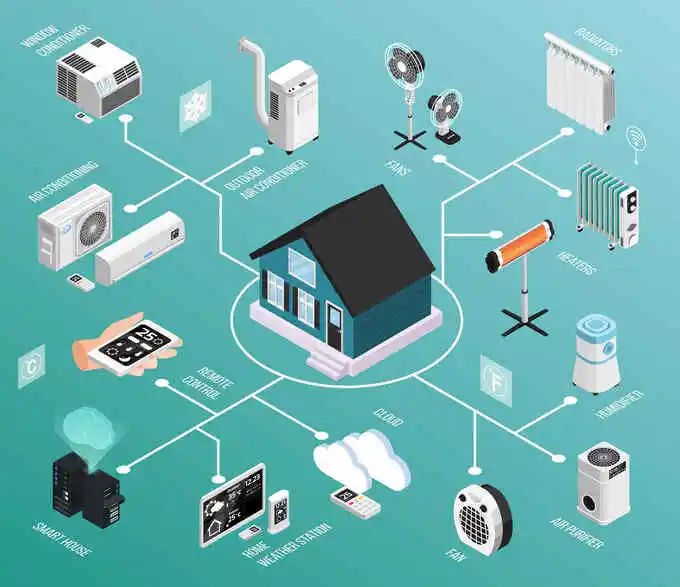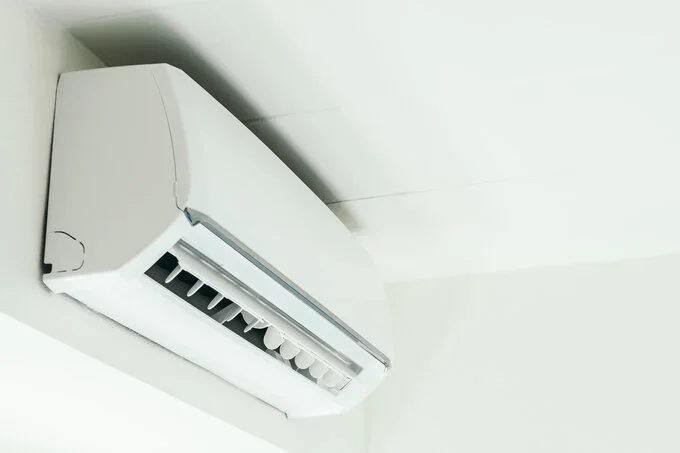How Many Types of AC ( Air Conditioner ) is Best for Home Comfort?
Table of Contents
ToggleHomeowners seeking refuge from warm weather should consider implementing an air conditioner system known as an AC. The correct air conditioning system serves to cool down your house while simultaneously improving air quality and decreasing humidity and creating a comfortable habitat.
Making a decision about your home comfort air conditioner between numerous product options in the market becomes a significant challenge. We will examine multiple air conditioning types together with their specific features as well as identify which system works best for different residential situations.
Your search will come to its conclusion after which you will know exactly which AC system will offer optimal comfort and worth for your house.
Types of AC ( Air Conditioner )

To achieve the best selection for an AC system you need to understand all available options first. The air conditioner market divides its products into five main groups including central air conditioners, window units, split systems, portable air conditioners and hybrid air conditioner.
The various types of AC present different advantages and limitations which match different property types and usage requirements. Here is type of AC for home:
- Window Air Conditioners
- Portable Air Conditioner
- Centralised AC for Home
- Split Air Conditioners
- Hybrid or Smart Air Conditioners
Window Air Conditioner

The whole system of a window air conditioner fits inside a single window space. A window air conditioner functions as an affordable way to cool down single areas of a home.
Window ACs remain a leading air conditioning option since they were introduced many years ago because people appreciate their reasonable costs and easy setup process.
Key Features:
Affordable: Window air conditioners represent an inexpensive cooling solution among various heat pump types on the market.
Easy to Install: These units offer straightforward installation before people can easily uninstall them during any non-operational period.
Space-Saving: Because window ACs occupy no ground space they serve as perfect units for small apartments and rooms.
Limited Coverage Area: Single-room apartments and houses benefit most from window air conditioners because they lack the ability to cool multiple spaces at once.
Best For:
- Window air conditioners work best for homes or apartments with single or pair of rooms that need cooling.
- People who have limited funds for cooling their home search for budget-friendly methods.
- The occupants of a property who cannot perform long-lasting structural alterations.
Portable Air Conditioner
A portable ac functions as a free-standing machine that allows users to shift it between different areas of a space.
The layout of portable ACs suits compact living areas and instances when installing a permanent cooling system is impractical.
The device includes a vented hose that must be placed through a window for hot air removal.
Key Features:
Mobility: A portable air conditioner offers easy mobility between rooms thus making it best for temporary cooling needs.
No Permanent Installation: Performing any type of permanent modification such as ductwork or window unit installation is unnecessary.
Limited Cooling Capacity: Portable ac possess limited cooling power compared to other models such that they are best suited for spaces ranging from small to medium rooms.
Noise: Portable ACs generate more noise when operating compared to both split systems and central air conditioners.
Best For:
- The product is best suited for people who live in rental accommodations and require mobility in their cooling solutions.
- The device provides simple setup because it requires no installation process.
- These cooling units serve spaces of any size when occasional temperatures need lowering.
Central Air Conditioner
Personnel who own enlarged homes or need cooling for various rooms frequently opt for central air conditioning systems as their main cooling solution.
The system functions by flowing cool air through ducts that extend across every room in the house.
Descended air conditioning systems both operate with high efficiency and deliver consistent cooling throughout entire households.
Key Features:
Even Cooling: All rooms in a property receive equal temperature management through central air conditioning systems.
Air Filtration: Integrated filtration systems are present in multiple central air conditioning units to enhance interior air quality.
Higher Initial Cost: Central air conditioning systems require a higher initial price than different air conditioning types at installation.
Efficiency: An installed properly and sized correctly central air conditioner will operate with superior energy efficiency.
Best For:
- Homes with numerous spaces must be cooled because of their large size.
- The device serves household owners who value a hidden cooling system that avoids deliberate unit placement.
Split Air Conditioners

Split air conditioners work with two essential elements which include interior and external units.
The internal section of the split air conditioner lives inside buildings while its external section operates externally with wall or ground placement.
Split air conditioners operate efficiently and quietly in comparison to window units thus making them preferred by numerous household consumers.
Key Features:
Silent Operation: The operating noise level of split systems falls under a range which window ACs cannot match.
Energy Efficient: Split system technology from today combines power efficiency with superior cooling performance that reduces the amount of energy consumption.
Zoned Cooling: 1.5 ton split ac enable zoned cooling capability because you can install them in separate rooms to independently control the temperatures in each space.
Aesthetically Pleasing: The sleek design of these units leaves windows unobstructed when open while window ACs do not achieve this effect.
Best For:
Hybrid or Smart Air Conditioners
- People who occupy houses containing multiple rooms and need individual room temperature control.
- Such an AC solution matches the needs of people who desire quiet operation alongside high efficiency and beautiful design.
- The unit provides flexibility for installation throughout various rooms of a house.
Modern air conditioning units that combine updated technology with conventional air conditioning systems provide features under the names hybrid air conditioners.
These systems integrate multiple features that include Wi-Fi connectivity along with smart thermostats and energy-efficient design for better control and automation functions.
Key Features:
Smart Controls: Homeowners can operate their smart air conditioner through mobile apps and link it to home automation networks which include Alexa and Google Home platforms.
Energy Efficiency: Many next-generation air conditioners use user habits to study preferences so they can adjust their energy consumption settings.
Customizable Features: Some smart air conditioning units provide built-in capabilities which include zone cooling alongside air purification capabilities and also regulate humidity.
Higher Cost: Advanced features drive up the price level of these air conditioning units above their standard counterparts.
Best For:
- Technical householders aiming to regulate their air conditioning systems through electronic control tools.
- Additional features including air purifiers and environmental control are available to household owners who use ductless air conditioning systems.
- People interested in the contemporary efficient cooling solutions available on the market.
Factors to Consider When Choosing the Best AC for Home Comfort
A decision about the best types of air conditioner purchase should start with evaluating multiple factors before proceeding with selection.
The air conditioning system you require depends on what you need as well as your home layout together with your spending power and the energy consumption you prefer. The following factors represent the important evaluation points:
Size of Your Home
The size of your residence establishes the appropriate air conditioning system which can be both effective and suitable for your needs.
Large residences should choose central air systems or multiple split units whereas apartments and single rooms work best with window or portable ac.
Budget
The cost spectrum of available air conditioning systems extends significantly wide from one another.
The installation and maintenance costs of central AC systems remain significantly higher than what you will pay initially for window units and portable ac.
An AC budget should include the capital expenditure and accumulated energy savings during its operational life cycle.
Noise Levels
Specifically portable air conditioners emit steady noise during operation. Customers who seek quieter operation should choose 1.5 ton split ac systems since these units create less noise than portable or window types.
Centralised ac for home devices produce minimal noise when operating thus surpassing the noise level of window and portable units.
Climate and Temperature Needs
People who face sweltering summers in their area should install central AC or split system units because these systems produce the best possible comfort in such heat and humidity.
Residents in areas with moderate temperatures instead of rainy conditions might effectively use either a window setup or a portable cooling unit.
Installation and Maintenance
Evaluate the process of putting in and sustaining your chosen AC system. To operate a centralised ac for home system properly you must have professional installation followed by regular duct cleaning and regular filter replacement.
The installation and maintenance of Window units and portable units remain straightforward but their leakage systems require service sessions and cleaning routines more often.
Energy Efficiency
The selection of an air conditioner needs to consider the aspect of energy efficiency as a priority factor.
Current air conditioning systems feature automatic energy-saving technologies like programmable thermostats together with variable speed fans integrated with energy-efficient compressors.
The selection of air conditioners should focus on units that possess high Seasonal Energy Efficiency Ratio (SEER) ratings to reduce energy usage.
Conclusion: Which Type of AC Is Best for Home?
There exists no universal solution when selecting the ideal air conditioner type for home comfort requirements.
Selecting an ideal air conditioner depends on your particular situation combined with the dimensions of your house and the available funding.
The following choice suits bigger homes or spaces that need simultaneous cooling in different rooms.
Central AC and multi-zone split systems work best due to their balanced operation together with state-of-the-art functionality and high air purity levels.
Portable or window air conditioners represent affordable installation solutions for use in apartments along with single rooms and rental properties.
Homeowners seeking system flexibility together with quiet operation will find 1.5 ton split ac systems to be their best choice.
Zoned cooling comes with the advantage of 1.5 ton split ac systems while they produce less noise than regular AC systems.
Public air conditioners with their current efficiency levels also provide maximum convenience functions and complete control features.
A suitable air conditioner for your needs becomes the one that combines functionality with your home’s structure and financial capabilities.
A thorough evaluation of these elements helps users select their ideal air conditioning equipment which maintains both comfort and energy efficiency throughout the entire year.
FAQ :
The majority of energy-efficient air conditioning choices include split systems combined with central ACs which possess high SEER (Seasonal Energy Efficiency Ratio).
A central air conditioner must be sized appropriately according to a room’s dimensions and insulation quality and amount of sunlight exposure. The selection of an AC model requires proper consideration of its BTU rating because it determines both comfort levels and operational efficiency.
Regular maintenance gives priority to filter replacement and cleaning as well as leak testing of refrigerant components and coil sanitation and airflow verification to maintain efficient system performance.
Certain split systems along with heat pump AC products provide heating functions and cooling performance which enables them to deliver year-round indoor comfort.
The main application of central air conditioning lies in large houses because it maintains consistent temperature levels through one exclusive system but requires higher installation costs.
The ability to cool certain spaces with portable air conditioners comes at a cost as these units operate less effectively and generate more noise than window or split systems do.
Window air conditioners function best in small living spaces along with restricted budgets yet split systems work better in vast apartments with quiet operation and superior cooling performance.
The market features four fundamental air conditioning systems which include window units together with split systems and portable models and central air conditioning systems.
I am an engineer in a government department and also a blogger. I write posts on topics related to electrical and electronics engineering.
